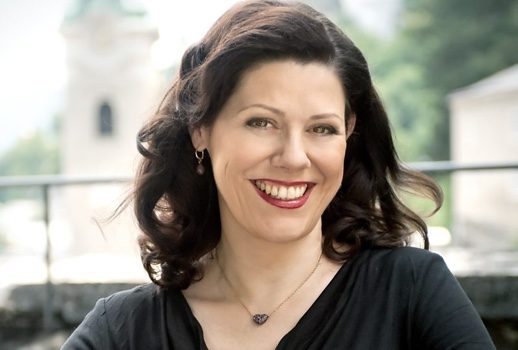

While the Amme’s writing is notorious for placing extreme demands on a dramatic mezzo’s technique and stamina, it is only during recent decades since theaters started presenting Frau uncut that audiences were able to savor the entirety of the character’s music.
While artists like Hanna Schwarz and Michaela Schuster are justifiably celebrated for imparting’s the Amme’s lines with exceptional musical fluency, no other singer in my mind approaches the towering standard set for this character by the German mezzo Tanja Ariane Baumgartner.
In terms of tonal beauty, vocal security, and musically inspired artistry, I would be hard-pressed to identify another singer who demonstrably conquers the composer’s difficult idiom while plumbing the depths of the character’s dramatic possibilities.
Baumgartner’s Amme can be experienced uncut from Sebastian Weigle’s set on the Oehms label. Although the recording features the work of several notable artists—including Tamara Wilson’s radiant Kaiserin, Terje Stensvold’s dignified and nobly sung Barak, and Burkhard Fritz’s lyrically vocalized Kaiser–it is Baumgartner’s incredible Amme that repeatedly draws me back to this highly recommendable performance.
In a role often assigned to autumnal dramatic singers prone to cackling and histrionic excess, Baumgartner brings a meltingly beautiful, bronzen mezzo that easily scales the treacherous vocal writing while sculpting phrases with impeccable musicianship and nuance. In her first act interactions with Hoffmansthal’s motley characters, Baumgartner dispatches the wide-ranging vocal leaps and explosive ascents with utmost security.
In Act 2, she skillfully depicts through vocal gradations the layered facets of the character’s externalized congeniality and internalized contempt for mortals during her temptation of the Dyer’s Wife, and caps the tumultuous finale with a radiant and electrifying top B-flat.
In the moments leading to her character’s exile in Act 3, Baumgartner eschews melodrama and fearlessly delivers the Amme’s desperate entreatments without straying from the boundaries of musical taste. If this Amme were the only recorded documentation of Baumgartner’s work, she would nonetheless have set a staggeringly high standard for this most complex Straussian creation.
More of Baumgartner’s work is fortunately well represented outside of Weigle’s Frau recording. Last spring, the singer made her sensational role debut as Kundry in a videocast production of Parsifal from Antwerp’s Opera Vlaanderen. While many mezzos come to grief with Kundry’s vocal leaps and high tessitura at the end of the central act, Baumgartner aced the entire role’s technical challenges while still capturing the whole spectrum of this complex character.
On surveying the five-year run of Frank Castorf’s Ring, no other artist gave as vibrantly characterized or as potent of a Fricka as Baumgartner did in the summer of 2017. Her portrayal of this character is something I was lucky enough to witness live in the Lyric Opera of Chicago’s new Ring Cycle, where she transcended a morass of flatfooted character direction with an incisive Fricka that commanded attention with every carefully modulated and sculpted phrase.
It is a testament to Baumgartner’s artistry that her performances of this brief, yet crucial role made the strongest impression in Chicago’s staging of the first two Ring operas.
In DVD’s that hail from Salzburg, one can sample her sensuous Countess Geschwitz in the 2010 production of Vera Nemirova’s Lulu, and a warm, luxuriously sung Charlotte in Alvis Hermanis’ 2012 take on Bernd Alois Zimmermann’s Die Soldaten. Another audio set from the Frankfurt Opera captures the German premiere of Aribert Reimann’s Medea (exceptional for Claudia Barainsky’s virtuoso reading of the antiheroine), where Baumgartner imbues the spiky vocal lines of Gora (Franz Grillparzer’s version of Medea’s nurse) with warm vocal tone and technically impressive 21st century coloratura.
In addition to demonstrating solid artistry in standard operatic repertory (glowing reviews often describe her assumption of mezzo and falcon parts by Wagner, Strauss, Verdi, Handel, verismo, French grand opera, and bel canto), Baumgartner has also consistently championed works by contemporary and modernist composers (e.g. Othmar Schoeck, Stravinsky, Hans Werner Henze, Mieczys?aw Weinberg, Rolf Riehm, Luigi Dallapiccolla, Beat Furrer) as a headliner and even a creator of characters.
Artists who command respect and adulation in such a broad range of vocal styles and idioms in the operatic literature are rare. Those who do the same in inspiring composers to create new characters are even rarer.
Parterre Box today is an influential voice in the world of opera criticism and appreciation. Opera singers visit these pages, and the administrative staff of many an opera organization likely do as well. It puzzles me that an artist of such a stellar caliber only made her U.S. debut in the fall of 2016 (Fricka in the LOC’s Das Rheingold), and that no high profile North American engagements are listed in her future.
I hope that my plug inspires you to explore more of this incredible artist’s work. If some of her repertory may not be to your liking, her tour de force interpretation of the Amme in Strauss’ Frau Ohne Schatten (the most accessible work in her discography so far) should at least give one pause for how excellently she traverses this summit of the dramatic mezzo fach.























Comments